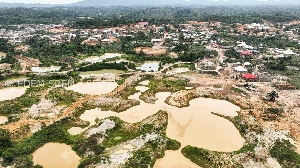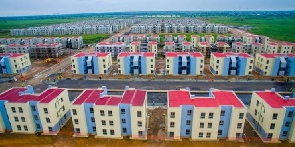Ghana’s battle against illegal mining, or "galamsey," has become a tragic epic where the supposed saviours of the environment have instead turned into its destroyers. Under President Nana Akufo-Addo and Vice President Dr. Mahamudu Bawumia, what began as a noble crusade has devolved into a story of betrayal and failure, where the guardians of Ghana’s natural resources have become its greatest villains.
Unfulfilled Promises: The Emperor’s New Clothes
When Akufo-Addo took the helm in 2017, he donned the mantle of environmental champion, vowing to eradicate galamsey even at the risk of his presidency. This grand promise was met with high hopes. Yet, nearly eight years later, the emperor’s new clothes are all too visible. Initiatives like Operation Vanguard, which sent military forces to combat illegal mining, have proven to be little more than a show of strength. While they may have created the illusion of action, they have done little to address the deep-rooted causes of illegal mining. The government’s approach has been akin to placing a bandage on a gaping wound. Instead of tackling the underlying issues such as poverty and the allure of quick profits, the administration has relied on short-term military fixes. This strategy has failed to make a significant impact, leaving the problem of illegal mining to continue ravaging the environment.
Bawumia’s Silence: A Mute Spectator in the Catastrophe
Vice President Bawumia, renowned for his focus on economic policies and digital innovation, has been a silent spectator in the drama of galamsey. His silence is a dark cloud over the administration’s efforts. The severe environmental damage and health risks from galamsey are met with alarming indifference from Bawumia, who seems detached from the crisis. His lack of action reflects a broader issue within the government. By failing to address this pressing problem, Bawumia and the administration show a disturbing disregard for the urgent need to protect Ghana’s resources.
Corruption and Accountability: The Rotten Core
Corruption has become the rot at the core of the fight against illegal mining. Reports of officials colluding with illegal miners and scandals like the "missing excavators," where seized equipment vanished, expose the deep-seated corruption within the system. Instead of confronting these issues head-on, the government has engaged in damage control, allowing the real problems to fester like an untreated wound. The betrayal is profound: those entrusted with protecting Ghana’s resources have become complicit in their destruction. This corruption has eroded public trust and allowed illegal mining to continue unchecked.
Konongo’s Crisis: A Silent Presidency
The recent crisis in Konongo, where illegal mining has surged and wreaked havoc on the environment, highlights the administration’s failure. Despite the scale of the damage, the presidency has remained silent, like an emperor with no clothes amidst a chaotic scene. The lack of response to Konongo’s plight underscores the broader failings of the Akufo-Addo administration. While political promises are made, the reality on the ground shows that illegal mining thrives with minimal intervention.
Leadership Failure: The Ship Sinking Without a Captain
The NPP government’s inability to tackle illegal mining effectively reveals a leadership failure. The grand promises made by President Akufo-Addo and Vice President Bawumia’s neglect reflect a significant gap between rhetoric and reality. The administration’s reliance on temporary measures and its failure to address systemic corruption have left Ghana’s environmental future hanging by a thread. As the 2024 elections approach, voters must scrutinize the administration’s performance. The ongoing crisis in Konongo and the broader failure to address illegal mining highlight the need for new leadership and a fresh approach to solving this problem.
A Call for Renewal
Under the NPP government, Ghana’s fight against illegal mining has become a tragic tale of betrayal and failure. The administration’s broken promises and the rampant corruption it has failed to address, coupled with the silent response to crises like Konongo, underscore the urgent need for a new direction. To protect its resources and secure a sustainable future, Ghana must demand leadership capable of delivering real results and restoring hope for a better tomorrow.
Opinions of Tuesday, 3 September 2024
Columnist: Mileba Godwin Kwame



















